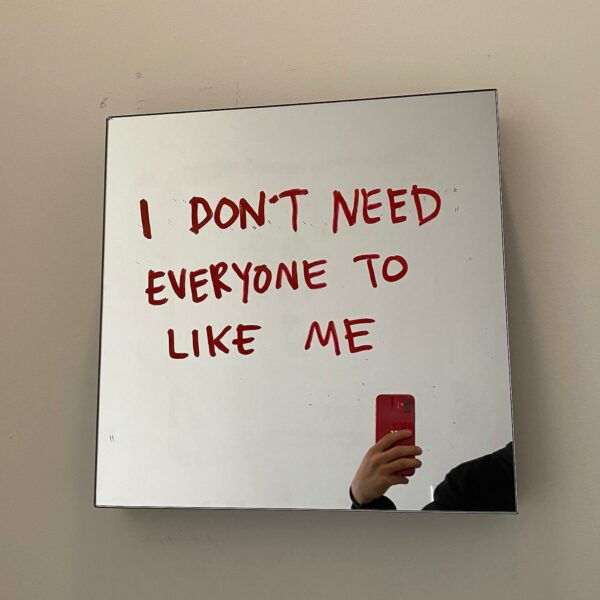It’s probably not as cut and dry as our fear of losing a loved one, being hit by a car, a home intrusion, or just straight-up spiders. However, for many of us, being afraid of embracing happiness is very real.
It’s not that the idea of joy sends us hiding under the covers and biting our nails. We aren’t stressed at the thought of a carefree life, or cringing at the idea of confident bliss. Typically, it’s that we aren’t used to the idea, or feel like we don’t deserve it. It’s so easy to self-sabotage a good thing in order to keep us in our regular state of meh—it’s what we’re used to, after all.
But what if we could practice total acceptance of ourselves, and move toward the light? No, not that light, not the end-of-times, bright, white light. We’re talking about success, love, and peace within ourselves. The kind of joy that comes from following our bliss and embracing what we’ve been given. The confident gratitude that gives life meaning, and allows us to spread even more of it. Let’s go there.
So often we get hung up on past mistakes. Maybe we’ve hurt someone. Maybe we’ve hurt several someones. Maybe we’ve embarrassed ourselves, or failed. Quick reminder—these are all part of being human. Being a perfectionist when we’ve already slipped up in very human ways is just our way of keeping ourselves down. When we tell ourselves we don’t deserve joy because we weren’t perfect in the past, we limit our capacity for success in every way.
Learn to accept the past, and move forward. There’s always room for growth, change, amends, and of course, more failures. Keep yourself in the present, and keep yourself moving forward. Happiness is a birthright.
We might pick fights with a new lover when things start going great. Maybe we start getting complacent at that job we can’t believe we nabbed, even though we’d be devastated to lose it. We need to remove ourselves from the mindset that if we lose something, we probably deserve it, so why even try anyway? Let’s go after what we want, unapologetically (without trampling anyone, of course).
We have to quit negative self-talk and be less reactionary. Approach goals, loved ones, and current successes with the love and care they deserve. They’re a part of us, so we should love them as we’d hope to be loved ourselves. Take care of the good, and watch it grow.
Quit asking yourself the what-ifs.
This notion goes hand-in-hand with self-sabotage. So often we remain stagnant in love and careers because we look at something that takes work and think, wow, so much could go wrong. When we ruminate on what could go wrong before even attempting to strive toward our goals, we remain stagnant. Stagnation can be comfortable, because change is scary, even good change. We need to cut the what-ifs and stop imagining all the possible negative outcomes, and just move toward our goals.
This one is easier said than done, but super effective. When we take this time to pause—because it does require pause—and evaluate all the good in our lives, we see that happiness is all around us. Maybe we have a cozy blanket that makes us feel relaxed, or a pet that we love dearly. Perhaps we have a reliable car that has years of life left in her. Maybe it’s smaller, or bigger—like a good hair day, the health of a loved one, a roof over our heads, our favorite snack in the fridge.
We can be grateful for so much. When we take the time to put it down on paper, it has a fertile effect. We see what we’ve made possible, and we are grateful for it; a feeling of joy. Joy is contagious, and we’ll be inspired to make more joy manifest in our lives. Let’s grow our gratitude lists, starting now.
Be as compassionate to yourself as you feel toward others.
It’s funny how we might feel such secondhand pain for someone else’s downfall or embarrassment, but repeatedly berate ourselves for our own shortcomings. The negative self-talk and unwillingness to forgive ourselves need to stop. If we can feel remorse, sadness, and even physical pain for someone else and want to cheer them up, we can do that for us too.
We have to work on self-forgiveness and lift ourselves up. It goes along with acceptance but takes it a step further. We accept what has happened, and choose to love ourselves anyway—with tender forgiveness.
Accept failures as inevitable steps, not final outcomes.
Failures can stop us dead in our tracks, paralyzing us in fear of moving forward. We fear failing again, and we’d rather stay static in a neutral state of inaction rather than risk anything for possible happiness. When we do this, we prevent ourselves from experiencing success, which is the ultimate failure.
We need to realize that failure is a necessary step when moving toward any goal that will make us happy. Only then can we move forward.
Define your version of happiness.
“Comparison is the thief of joy,” Theodore Roosevelt famously said. With social media, it’s difficult to determine our own version of success and happiness, because we are constantly inundated with others’ versions of it, and made to feel like if we aren’t doing what they’re doing, we aren’t successful in life and thus, aren’t happy. But happiness looks different to us all.
When making our gratitude lists, take it a step further. Illustrate in the mind what happiness means and looks like to you—a visualization practice. Just like manifestation, having a clear idea of what would bring us ultimate joy in life helps set us on the path to actualizing it.
When we spread the kind of love we want to receive, the chances of actually receiving it back are multiplied 100-fold. Not only are we showing others what it feels like to be appreciated wholly, but we are inspiring in them positive energy, as well as planting the seed to do the same. It’s as simple as spreading happiness to see it come back to you.
Shop popular Poosh products:
Up next, shop the newest items from the Poosh Shop here.






































